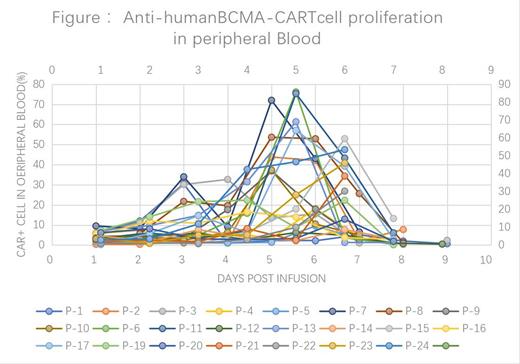Abstract
Introduction
Multiple myeloma is a hematological malignancy that is prone to be companied by bone marrow destruction, renal impairment and extramedullary infiltration. Current treatments include proteasome inhibitor, immunomodulatory drug, hematopoietic stem cell transplantation, and monoclonal antibody targeted therapies. However, it is still clinically incurable. Chimeric antigen receptor (CAR) T-cell therapy is a new immune targeted therapeutic strategy. It is reported better clinical efficacy for relapsed/refractory multiple myeloma (r/r MM) treatment has been achieved by immunotherapies targeted B-cell maturation antigen (BCMA). Therefore, it is important to investigate the treatment of a novel human BCMA-specific CAR-T therapy for r/r MM.
Objective
The objective of this clinical study is to evaluate the safety and efficacy of the novel human BCMA-targeting CAR-T therapy in patients with r/r MM, especially patients who relapsed from prior CAR-T therapy.
Method
This work is a clinical study registered and investigated by our center. CD3+ T cells were negatively selected from patients' peripheral blood mononuclear cells, activated and modified by lentivirus to produce anti-BCMA CAR-T cells. The cells were administrated intravenously to patients after expanding for 7-13 days in vitro. 24 patients had enrolled in this study, with 13 males and 11 females. The median age was 53 years old (range,41-75), and patients with cytogenetically high risk factors accounting for 41.66% (10/24). 50% (12/24) was infiltrated with extramedullary lesions. 16.6% (4/24) of them had relapsed from other CAR-T therapies before this enrollment. 50% (12/24) had been previously conducted autologous hematopoietic stem cell transplantation (HSCT), whereas 4.16% (1/24) with allogeneic HSCT. Patients with the expression of BCMA in the plasma cells higher than 30%, accounted for 25% (6/24). 2-3 days after being administered the lymphodepleting chemotherapy regimen, CAR-T cells were infused intravenously. The indicators of patients' condition were detected, including inflammatory cytokine concentration, serum protein levels, CAR-T cell number copies, and the proportion of plasma cells by bone marrow biopsy. The improvement of patients, the occurrence of adverse reactions, the incidence and grade of cytokine release syndrome (CRS), was analyzed and evaluated.
Result
All patients received infusions of CAR-T positive cells at the average dose of 9.45×10 6/kg (5-17.5) and the median injection day is the 10th day (8th-13th day) after cell isolation. After infusion, 100% (24/24) of the patients had fever lasting for 48 hours, with 37.5% (9/24) of them showing low blood pressure and being treated with drug. Heart rate increase was found in 45.8% (11/24). Nausea, diarrhea and transient consciousness disorder occurred in 50% (12/24), 33.3% (8/24), and 12.5% (3/24) of them, respectively. 16.6% (4/24) was administrated with dexamethasone to relieve symptoms, with the total dose less than 20 mg, while nobody was treated with IL-6 receptor antagonist. CAR-T cells had expanded in all patients, reaching the peak at the 4th day after infusion (Figure). The levels of IL-6, IL-8 and IFN-γ in peripheral blood also increased significantly. The incidence of CRS is 100%, of which grade I, II and III is 62.5%, 33.3% and 4.2%, respectively. 2 patients showed grade I CRES, constituting 8.3% (2/24). All patients were assessed for the efficacy of CAR-T cells 2 weeks after infusion. ORR was 100%, with 4.2% (1/24) MR, 8.3% (2/24) PR, 62.5% (15/24) VGPR and 25% (6/24) CR. 18 patients were treated for more than 1 month, with 11.1% (2/18) PR, 44.4% (8/18) VGPR, 11.1% (2/18) CR, and 33.3% (6/18) sCR. 16 patients were infused before more than 2 months, with 25% (4/16) VGPR, 12.5% (2/16) CR, 50% (8/16) sCR, and 12.5% (2/16) PD. 6 patents were administrated more than 3 months ago, with 1 developing deep remission to sCR from VGPR. The others remain the same condition.
Conclusion
The novel human BCMA targeted CAR-T cell therapy of this study showed safety and efficacy in the treatment of r/r MM patients with extramedullary infiltration, high-risk cytogenetical factors as well as relapse with prior BCMA CAR exposures. Deep remission can be achieved. However, more observation need to be conducted. The CAR-T treatment of BCMA target still cannot prevent the disease progress of a small numbers of patients. The control after CAR-T therapy needs more investigation.
No relevant conflicts of interest to declare.


This feature is available to Subscribers Only
Sign In or Create an Account Close Modal